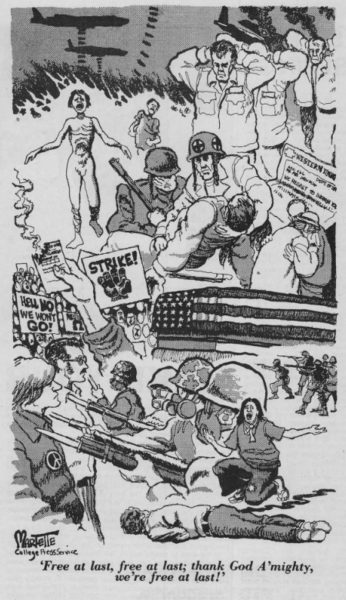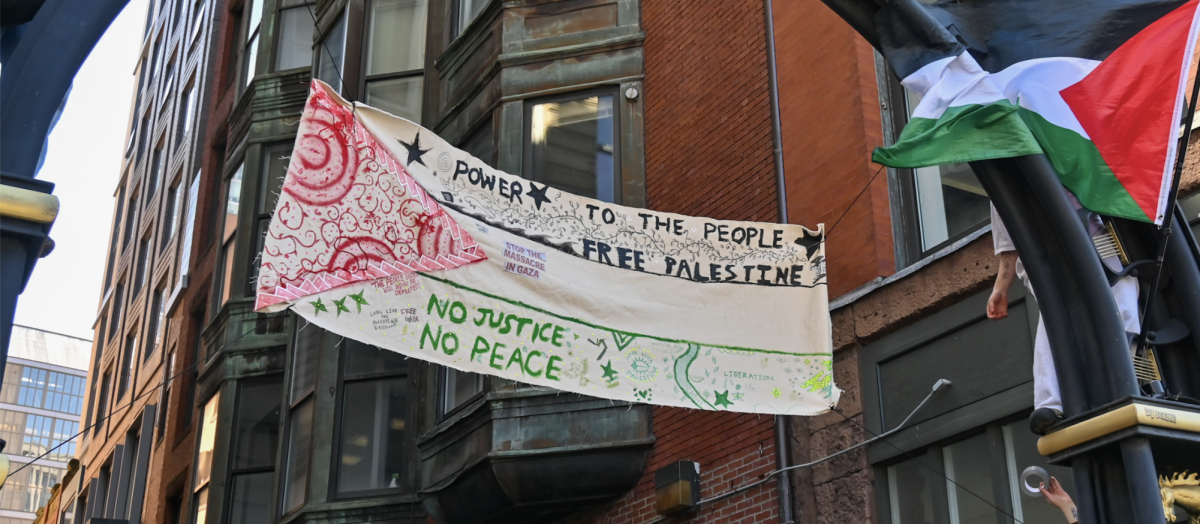Fifty-two years ago, The Suffolk Journal’s Editorial Board gathered with students in the Ridgeway building to voice concerns over the United States Pentagon’s campaign targeting Vietnam.
These editors met on May 8, 1972, to author a special edition of The Journal to voice their opinions about ongoing protests across both Suffolk University and the nation.
“As Suffolk students, and furthermore as members of the college press who are bent on the expression and exchange of ideas, we looked around us and saw to our dismay that the members of our academic community were not being given the opportunity to express themselves as members of this community, nor to express themselves in a voice of solidarity,” their message read.
Now, as our peers and neighbors in Boston face violent resistance as they call for divestments and a ceasefire, The Suffolk Journal Editorial Board wants to emphasize this message from all those years ago. We stand in support of protesters across the United States who are fighting for their beliefs, as the right to peaceably gather and freely express opinion is unequivocal.
At the very universities that teach the historical importance of dissent and public debate, students are facing the threat of arrest and violence from law enforcement at the behest of administrators meant to serve their needs. Punishing students for exercising their rights does not align with the principles universities seek to foster and will only energize students’ responses.
As activists peacefully yet adamantly hold our institutions accountable for their actions, they are met with hypocrisy from both university and government administrations. While the causes and the politicians are different, the responses are the same: peace is met with undue and unfair force.
Student-led protests against the Vietnam War were met with harsh responses from university officials and proved devastating results are possible when law enforcement is brought in to dissolve protests. On May 4, 1970, members of the Ohio National Guard fired into a crowd of anti-war protesters at Kent State University, killing four and injuring nine others.
History offers us warnings time and time again, as it is right now: Violent and forceful responses from the very institutions that are meant to keep society safe will not silence voices, it will only end in tragedy.
Evidence of this truth exists across generations and distances. From the Civil Rights movement and protesting the Vietnam War to the Black Lives Matter movement and anti-apartheid protests, the continued violent repression of these voices dooms history to repeat itself.
The right to voice free speech and to peacefully assemble is tarnished the moment our law enforcement chooses violence as a response to peaceful protests.
While law enforcement reserves the right to dismiss protests when they violate city laws, it is imperative that the scales of justice tilt in the direction of free speech. When comparing the First Amendment of the Constitution to a city ordinance established in 2023, we have to ask ourselves which our society should value more — allowing citizens to freely express opinions or enforcing city ordinances as a display of power.
Testimonies from those who participated in Boston encampments showed that these protests were safe and peaceful until law enforcement’s aggressive arrival, where they forcefully removed and detained activists resulting in numerous injuries and hospitalizations.
While law enforcement maintains the right to remove activists and disband the encampment, their response should never result in blood on the streets.
The First Amendment grants the right to free speech, protest and assembly, allowing for a marketplace of ideas where power never goes unchallenged and every person can have and express their own perspective. This discourse motivates change; to violate this right with violent responses is to go against the core values of our country.

This amendment is the cornerstone of our democracy. It is the backbone of progress that has defined the United States for over half a century; to deny its protection to citizens peacefully protesting is a disservice to history and our future.
As a news publication, we strive to serve our community in an unbiased and equal light. However, when institutions across America don’t allow our peers to do the same, we must speak up. When our institutions refuse to give voices equal footing and instead tear down peace with violence, we must stand up in the face of injustice.
Echoing the voices of our peers in 1972, we must ensure our community can stand proudly in solidarity.





















Carlos Rufin • May 1, 2024 at 10:27 am
Thank you for your Editorial stance about the campus protests. Your message is essential as peaceful protests are being met by police repression across the country, including Boston, and an orchestrated campaign to delegitimize these protests as acts of antisemitism.